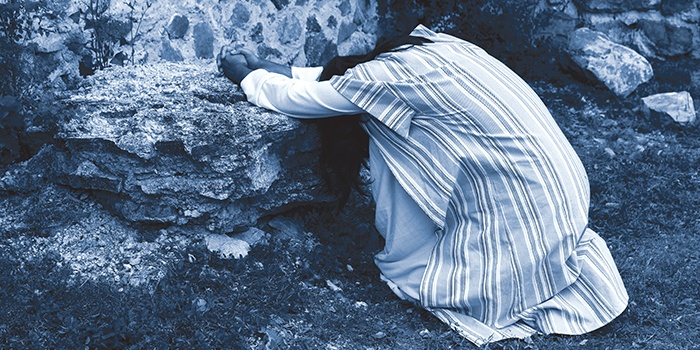Like us, Jesus could be besieged by his emotions. But his example shows us that God is there to comfort and support us.
Lately, as I’ve been praying the rosary, I’ve been reflecting specifically on Jesus’ agony in the Garden of Gethsemane the night before he died. It struck me that he must have been feeling weighed down by three strong emotions that all of us experience at various times in our lives: fear, loneliness, and a sense of failure.
So powerful were those feelings that, as the Gospel of Luke tells us, “his sweat became like drops of blood falling on the ground” (Lk 22:44). This is not hyperbole but a medical phenomenon: Under severe emotional stress, the small capillaries can become so engorged with blood that they burst, allowing blood to seep through the sweat glands. Knowing what was ahead of him, it is understandable that Jesus would be overwhelmed by his emotions. Luke’s description of this dramatic scene invites us to engage in deeper reflection and consider times when we, too, have succumbed to our feelings.
Following Christ’s Example
When Matthew describes this scene, he says that Jesus “began to feel sorrow and distress” (26:37). But I believe that his primary emotion would have been fear. Like all Jews at that time, Jesus would have been familiar with the Roman manner of execution: death by crucifixion.
It was an incredibly cruel and brutal manner of putting someone to death. First, there was the scourging of the body with whips that tore the flesh, then forcing the criminal to carry his own cross through the streets of the city, despite being weakened from the loss of blood. Finally, the criminal was fastened to a cross and forced to hang there until his legs could no longer support him. Unable to breathe, he would die of asphyxiation. The soul of Jesus must have been shrinking with fear as he thought of facing those terrible physical tortures.
We have all experienced fear and anxiety: taking a wrong road at night and losing our way; worrying when we or our loved ones have a serious illness or accident; feeling anxious about losing our job; fearing not being accepted by our peers. Yet the word of God constantly urges us to put aside fear and anxiety. I once heard a Scripture scholar say that the words fear not or do not be afraid appear in the Bible 365 times—one for each day of the year!
A word of caution: Because of our human fragility and the many dangers in the world around us, it is impossible to be free of all fear and anxiety. Both are normal physiological responses to threats or danger.
Instead, I understand do not be afraid to mean “do not let fear determine your choices.” Many sins, I believe, are driven more by fear than by evil intent. For example, people often tell lies because of the fear of looking bad or being criticized rather than with the intent to harm others. Or they insult or ridicule other people out of fear of not being accepted by their peers. Even sexual sins are often driven by the fear of not being loved rather than by lust.
Returning to Jesus’ agony in the garden, the Gospels describe a man overcome with fear to the extent that it manifests in a bloody sweat. Yet, despite that, Jesus did not allow his fears to turn him away from his passion and death. Instead, he made the decision with seven simple words: “Not my will, but yours be done!”
Turning to God to Deal with Loneliness
The second strong emotion Jesus experienced in his agony was a profound loneliness. All three synoptic Gospels state that Jesus asked Peter, James, and John to accompany him into the garden and to keep watch and pray with him. But each time he rose from his prayer and went to them, he found them sleeping. His disappointment was evident in his gentle rebuke: “So you could not keep watch with me for one hour?” Then, in a note of compassion, he added, “The spirit is willing, but the flesh is weak” (Mt 26:40‚ 41).
But the realization was unmistakable: Jesus could not count on the emotional and spiritual support of even his best friends. He would have to face his sufferings alone.
Social-science surveys have revealed the large numbers of people in our nation who experience strong feelings of loneliness—this at a time when communication via social media, opportunities for travel, or connecting with people on the Internet are more abundant than ever. I once heard someone put it like this: “We have an abundance of connections, but a scarcity of relationships.”
Adult children leave their birthplace to find jobs in places far from home. Friendships formed in high school or college often do not survive the many geographic moves. Romantic relationships can be strained or broken when new jobs require cross-country transfers. And hearts are broken when those dreaded words are spoken: “I just don’t think we are a good fit.”
Add to this the huge numbers of people whose marriages have been broken by separation or divorce.
So it can be spiritually helpful to reflect on the loneliness of Jesus, especially during his agony in the garden, and how he dealt with feelings. As he became aware that he could not rely on human support, he turned to his Father in heaven. Undoubtedly, he recalled those two powerful moments in his life—his baptism and his transfiguration on the mountain—when he heard the voice of his Father: “This is my beloved Son, with whom I am well pleased” (Mt 3:17). He was strengthened by the comforting message: “I love you. I am with you. I will never abandon you.”
The Church teaches us that God has spoken the same words and made the same promise to each of us at our own Baptism: You are my beloved son/daughter. In you I take delight. “I will never forsake you or abandon you” (Heb 13:5). Loneliness is not a disease or a disorder. It is a painful situation that simply has to be endured. Sometimes it can be ended by our efforts to reach out and make connections with others. In the meantime, we find comfort in the fact that Jesus, our savior, has shared—and understands—our pain.
Finding Comfort in Jesus
The third source of suffering for Jesus in his agony, I believe, was a sense of failure. With a few exceptions, he had been unable to convince the Jewish religious leaders that he was the long-awaited Messiah in whom God’s promises were being fulfilled. Moreover, he knew that even the ordinary people who welcomed his teachings and were thrilled at his healings and other miracles would soon join the crowd calling for his death. And perhaps worst of all, even his chosen apostles and friends would abandon him in the end.
Again, is this not often our own experience? We work so hard and put our best efforts into some worthwhile project, only to see it fail or be rejected. Or we aspire to reach a certain goal or dream in our lives, only to see ourselves fall short. Parents may feel a deep sense of failure when one or more of their children get into trouble with the law, become addicted to drugs or alcohol, or get divorced. Most of the time, parents have no reason to blame themselves for these problems, yet they may feel responsible—along with a deep sadness and a sense of helplessness. So it can be helpful for any of us who experience failure to recall that Jesus, our savior, truly understands what we are going through.
In the midst of his feelings of self-doubt and failure, Jesus is given consolation: “To strengthen [Jesus], an angel from heaven appeared to him” (Lk 22:43). What comfort did this envoy from heaven provide? I would like to think the angel revealed to Jesus the millions of people who would come to believe in him, receive Baptism and the other sacraments, and live faithful lives of love and service, often to the point of sharing in his sufferings through their own martyrdom.
Drawing Strength from Our Lord’s Sufferings
During this Lenten season, we can draw spiritual strength and inspiration from our meditation on Jesus’ agony in the garden. Perhaps we can learn to embrace our own times of agony in union with him, so that those times can be sources of spiritual growth for ourselves and for the people the Lord brings into our lives. Moreover, our prayerful meditation on this mystery will inspire us to act as comforting angels to people around us who are hurting or bearing heavy burdens in their own lives.









2 thoughts on “Lessons from Jesus’ Agony in the Garden”
Good reflection. Source of relief when I was anxious. Thank you
During the agony Jesus was alone,all his friends deserted him.Now Iam also lonely.With my financial dilemma,allmy friends have left me alone and frightened.Lord God come and help me. Get me a meaningfull job.Gonna are the days I used to give to the church,but these days have nothing to give Lord remember the donation I gave towards Mary’ Gorrtto in Makondo Catholic parish Makondo church.God base on that donation and provide me a job, Through Christ our lord.Amen